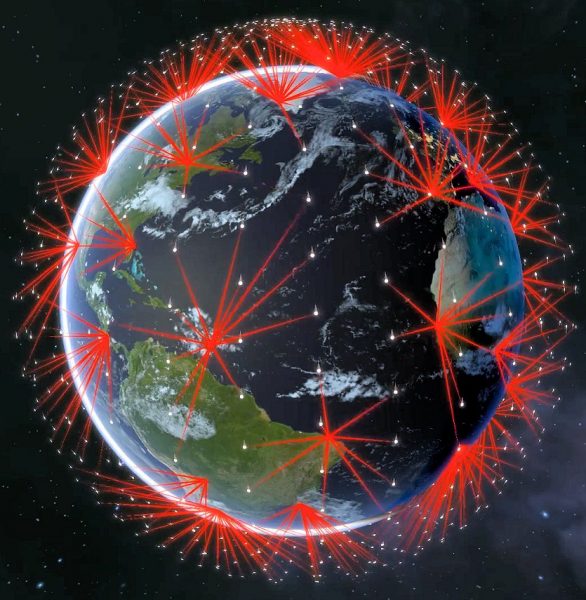OneWeb Broadband Satellite Service Sold to UK Gov Consortium

The Government and Indian conglomerate Bharti Global have today made a successful £800m ($1bn) bid to acquire the British-registered space company OneWeb, which will see the UK invest £400m ($500m) in order to help build a new global network of Low Earth Orbit (LEO) satellites for ultrafast broadband and possibly GPS.
Until a few months ago OneWeb was still in the process of building a large constellation of 648 compact LEO satellites (74 have already launched), which would have seen them achieve a reasonable level of global coverage by around the end of 2021. In theory this constellation could then grow to many thousands of satellites, as demand requires (here).
The low altitude of such spacecraft enables them to deliver significantly faster latency and “fibre-like” broadband ISP speeds have also been promoted for remote areas. Indeed an early test from last year hit speeds of 400Mbps and delivered an average latency of 32ms, which is impressive for a Satellite technology (existing satellites are usually much slower).
Advertisement
The huge double-decker bus sized geostationary orbit (GEO / GSO) satellite(s) of old sit many times further away from Earth (distance of about 35,000km+ vs around 500-1300km for LEOs) and have significant coverage, but their snail like latency times and limited capacity are a disadvantage for broadband performance. Likewise each one takes years and hundreds of millions to build, which makes them slow to adapt.
Unfortunately OneWeb, which has already had c.$3bn of investment from SoftBank in Japan, is the kind of high risk space company that has to spend vast amounts of money before being able to make any income (most are like that but LEO constellations on this scale are an entirely new field). Today’s deal won’t change that reality.
Suffice to say that money worries are a fact of life for OneWeb and this has recently combined with the arrival of COVID-19 to create a perfect storm, which forced the company to file for voluntary relief under Chapter 11 of the Bankruptcy Code in the USA. Since then they’ve been desperately hunting for a buyer and a consortium involving the UK Government has today won the bid.
OneWeb’s Future Direction
The official announcement states that the UK government will invest $500 million and take a “significant equity share” in OneWeb. Meanwhile Bharti, which is the third largest mobile network operator in the world (over 425 million customers), intends to provide the company with commercial and operational leadership, as well as a “revenue base to contribute towards its future success.”
Advertisement
The deal specifically states that it will enable the company to “complete construction of a global satellite constellation” in order to provide “enhanced broadband” and “other services” to countries around the world. Previous reports have said that the Government will attempt to adapt OneWeb’s fleet to support a new complementary GPS style navigation / positioning system (i.e. cheaper than investing up to £5bn to make their own), although today’s deal makes no specific mention of that.
The agreement also seems likely to result in some or all of OneWeb’s manufacturing base being moved into the UK, where there is a fairly strong satellite construction industry present.
Alok Sharma, UK Business Secretary, said:
“This deal underlines the scale of Britain’s ambitions on the global stage. Our access to a global fleet of satellites has the potential to connect millions of people worldwide to broadband, many for the first time, and the deal presents the opportunity to further develop our strong advanced manufacturing base right here in the UK.”
Adrian Steckel, CEO of OneWeb, said:
“We are delighted to have concluded the sale process with such a positive outcome that will benefit not only OneWeb’s existing creditors, but also our employees, vendors, commercial partners, and supporters worldwide who believe in the mission and in the promise of global connectivity. The combination of HMG and Bharti will bring immediate value as we develop as a global leader in low latency connectivity.
This successful outcome for OneWeb underscores the confidence in our business, technology, and the work of our entire team. With differentiated and flexible technology, unique spectrum assets and a compelling market opportunity ahead of us, we are eager to conclude the process and get back to launching our satellites as soon as possible.”
On the surface this deal appears to make sense and that may well be confirmed over the coming years, but on the other hand OneWeb remains an unproven business model and they’re up against better established rivals, such as SpaceX. Similarly the idea of using LEOs to do GPS does have merit, although there are a lot of unknowns about how you adapt that to these satellites (they weren’t designed for GPS) and how effective it would be.
Lest we forget that the Prime Minister, Boris Johnson, has put £5bn on the table to help spread “gigabit-capable” broadband to every home by the end of 2025, which will focus on the final 20% of premises. Admittedly OneWeb’s network doesn’t seem likely to deliver 1Gbps to each home, but as a measure of last resort it could still have a role to play (note: government frameworks often set a lower minimum speed threshold).
Advertisement
However the Government may risk becoming the target of rising anger from astronomers, particularly if the LEOs turn out to be as disruptive to astronomical observation science as feared. SpaceX’s rival Starlink network has already given us a few hints about that, which is despite the fact that none of these constellations are currently anywhere close to their final size (NOTE: LEOs have a short lifespan and they will de-orbit to help control the “space junk” problem).
One way or another the Government are taking a risk and it’ll be interesting to see how it all pans out. Otherwise the transaction remains subject to approval by the U.S. Bankruptcy Court, as well as regulatory approvals and customary closing conditions, but those should be done by Q4 2020.
Mark is a professional technology writer, IT consultant and computer engineer from Dorset (England), he also founded ISPreview in 1999 and enjoys analysing the latest telecoms and broadband developments. Find me on X (Twitter), Mastodon, Facebook, BlueSky, Threads.net and Linkedin.
« Ofcom Calls on UK Telecoms Firms to Extend COVID-19 Billing Support
B4RN Aim FTTH Broadband at 40,000 Rural UK Premises by 2022 »





















































i know people will moan, but £400m for all of that is not that bad a price really especially if it means low-latency high speed access for the entire UK. GPS is a bonus I suppose.
In my opinion realistically, SpaceX will achieve this first and probably be well on their way rolling it out worldwide before this is even anywhere near ready. I also don’t see it as likely to be a reliable system for the areas in which it would more than likely end up being the only solution available such as extremely rural locations. Don’t get me wrong, the dream of faster low-latency internet access is great and the slightly improved GPS system potentially available would be a bonus but the amount of risk and costs involved i’m not entirely sure that it’s worth it.
@John, you need to go read up on LEOs mate. They will be perfect for “really remote” places.
SpaceX are indeed banging up new batches every few weeks at the moment, so of course they will be first. If memory serves i think you only need 15-20 LEO sats to provide global coverage. Obvsiously bandwidth will dictate you need more.
Its not that bad a deal. Better/faster than building our own and they can always pivot the company if it falls on its ass.
That £400m is just the buy in price! They’re on the hook to the Russians for the next couple of launches right away and in total are going to need to pay for 12-16 launches at Russian prices of North of £150m a launch not counting the cost of the 600 odd satellites.
Also, the assertion that manufactering may in part move to the UK is by no means guaranteed, or even a good idea. The US will have final say about their tech being manufactered abroad and Florida, the current base of manufactering, loves rocket jobs! It’s also a race against spacex to get the constellation up and running and spacex already have a serious lead so I doubt stopping production and moving it to the UK would be feasible because of the delay.
This is either
a. A cunning plan to get a GPS system working on a LEO based satellite system.
If successful then will any GPS receiver companies be interested in using it as there are four in operation already.
b. A cunning plan to ensure we all get gigabit broadband by the end of 2025 as promised. (Boris’s Plan B)
The gigabit promise must be kept, I saw Boris on a dumper truck the other day, so I expect he is getting ready to help out.
Of course it could be 400m GBP [bad boris word, alt word wasted]
Many questions remain including:
What will it cost to complete the white elephant… sorry… constellation?
Who will be paying these costs?
Who will design and construct these magical new Broadband / LEO Global Navigation satellites?
What launch vehicle would be employed to complete the constellation? (Surely the Russian Soyuz, used to orbit the existing 74 satellites, is now out of the question, Europe’s Ariane 5/6 too politically inconvenient, SpaceX seems unlikely re Starlink, the American Atlas V relies on Russian engines and is not competitively priced, Chinese Long March 2/3 is unthinkable, perhaps Bharti Enterprises will push for an Indian launch vehicle?)
Will it ever fulfil its new planned purpose?
Will it ever become commercially viable?
If it does generate a profit, will the profits be returned to the exchequer or siphoned-off by the existing creditors and new commercial partners?
Think they’ll continue to use the Soyuz operated by Arianespace at the European space port in French Guiana we’re still a part of the ESA as well by the way
Has anyone seen the starlinks download speed report yet. Oneweb did this in 2019 for the FCC. Just deploying birds is easy making them work with multiple ground networks is another problem.
I am about to move to a sub-saharan country where Airtel operate. If I understand it, these LEO sats can replace some of the ground infrastructure. So Bharti Airtel is basically buying one of their suppliers that will help them expand to lower infrastructure regions?
Is the $1bn cash enough to finish the first constellation of 650 at current design and get some money coming in? Seems like it might be close if it so far cost ~$3bn to complete the R&D and get the first 70 sats up.
@GrantDee: “the $1bn cash enough to finish the first constellation” No it’s not, it’s a drop in the ocean, further financing has not been made public, it’s all a bit pie in low Earth orbit…
Just as a matter of interest, why do you need satellites for GPS these days? Couldn’t you just use stationary ground based phone masts to triangulate position?
@B – how would you get accurate elevations? And many places you just see one phone mast. And how would this work in valleys, deserts, remote areas and oceans?
Apart from that, yes, good scheme. Greater accuracy comes from seeing more transmitters.
All aircraft and shipping use GPS – there are no towers in the sky or at sea. Satellite GPS, minimum of 3 satellites in view, ideally at least 6 out of 12 give you full elevation data, and globally even at 50,000 feet (military aircraft).
Next problem, all 4G and 5G towers and masts have a GPS antenna/receiver to obtain a timing reference signal so 4G and 5G base stations remain synchronised. As mobile speeds increase and the technology gets more complex to deliver those speeds and low latency then accurate timing becomes even more critical – no timing and the network could collapse if timing has not been provided by the backhaul network.
You’re often in range of only one cell tower and won’t be able to get a location and triangulation from mobile base stations isn’t that accurate anyway, meanwhile you can easily be within range of 20+ GNSS sats across all 4 global GNSS networks (which is why I think it’s a waste of money adding more as you only need 4 of them for an acuate location)